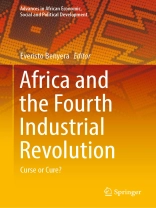This book examines the epistemological, political, and socio-economic consequences of the Fourth Industrial Revolution (4IR) for Africa. Presenting various case studies on epistemic freedom, theology, race and robotics, tertiary education, political and economic transformation, human capital, and governance, it debates whether the 4IR will be part of the solution to the African problem, namely that of coloniality in its various forms. Solving the African problem using the 4IR requires ethical, just and epistemologically independent leadership. However, the lack of ICT infrastructure militates against Africa’s endeavours to make the 4IR a problem-solving moment. To its credit, Africa possesses some of the major capital needed (human, mineral, and social), and it constitutes a huge market comprising a young population eager to participate in the 4IR as problem-solvers and not as a problem to be solved—as equal citizens and not as the marginalized other.
Table of Content
On the elusiveness of epistemic freedom in Africa and the need to unmask the colonial contract.- Race and Robotics: Black Theology in the Digital Age.- University 4.0: A Conceptual Model For South African Universities And The Fourth Industrial Revolution.- Against the grain: The tragedy of Zimbabwe in the context of 4IR.- Africa and the Fourth Industrial Revolution: Turning a Curse into a Resource through the Prism of Human Capital.- Rising to the Occasion: Africa, the 4th Industrial Revolution and Lessons from China.- Survival of African Governments in the Fourth Industrial Revolution.- The Fourth Industrial Revolution and Africa: A cure which kills the patient.
About the author
Everisto Benyera is Associate Professor of African Politics in the Department of Political Sciences at the University of South Africa in Pretoria. He is Decolonial Reader and holds a M.Sc. in International Relations from the University of Zimbabwe and a Ph.D. in African Politics from the University of South Africa. He researches on transitology and transitional justice focusing on indigenous, traditional, and non-state reconciliation, peacebuilding, and healing mechanisms. He is Editor of the journal Politeia, Journal of Political Sciences and Public Administration and Management.












